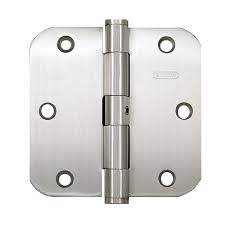hinge
英 [hɪndʒ]
美 [hɪndʒ]
- n. 铰链,折叶;关键,转折点;枢要,中枢
- v. 用铰链连接;依…为转移;给…安装铰链;(门等)装有蝶铰
使用频率:

记忆方法
“很紧”----铰链很紧,转不动
1. hang => hinge.
2. The notion is the thing from which a door hangs.
3. hinge把门板挂在门框里的东西。
1. hang => hinge.
2. The notion is the thing from which a door hangs.
3. hinge把门板挂在门框里的东西。
中文词源
hinge 铰链,门合页
来自PIE*konk,悬挂,词源同hang.引申词义绞链,门合页。
英语词源
- hinge
-
hinge: [13] Hinge is generally agreed to be related to the verb hang, and to mean etymologically ‘something on which a door hangs’, but the circumstances of its formation are obscure (as indeed are the reasons for its rhyming with singe, a 16th-century development; before that it rhymed with sing).
=> hang - hinge (n.)
- c. 1300, "the axis of the earth;" late 14c. as "movable joint of a gate or door," not found in Old English, cognate with Middle Dutch henghe "hook, handle," Middle Low German henge "hinge," from Proto-Germanic *hanhan (transitive), *hangen (intransitive), from PIE *konk- "to hang" (see hang (v.)). The notion is the thing from which a door hangs.
- hinge (v.)
- c. 1600, "to bend," from hinge (n.). Meaning "turn on, depend" is from 1719. Related: Hinged; hinging.
权威例句
- 1. Fit hinge bolts to give extra support to the door lock.
- 安上铰链插销,让门锁更牢靠。
- 2. Running water is never stale and a door - hinge never gets worm - eaten.
- 流水不腐,户枢不蠹.
- 3. Does not success or failure hinge on this?
- 成败之机,其在斯乎?
- 4. The hinge is insecure.
- 这铰链松了.
- 5. A door turns on its hinge.
- 门依靠门枢而转动.
